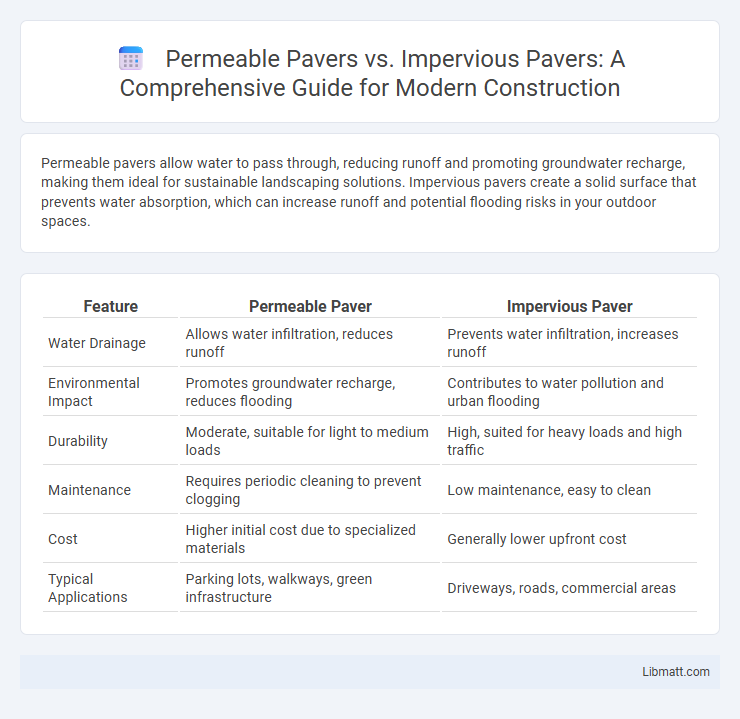Permeable pavers allow water to pass through, reducing runoff and promoting groundwater recharge, making them ideal for sustainable landscaping solutions. Impervious pavers create a solid surface that prevents water absorption, which can increase runoff and potential flooding risks in your outdoor spaces.
Table of Comparison
| Feature | Permeable Paver | Impervious Paver |
|---|---|---|
| Water Drainage | Allows water infiltration, reduces runoff | Prevents water infiltration, increases runoff |
| Environmental Impact | Promotes groundwater recharge, reduces flooding | Contributes to water pollution and urban flooding |
| Durability | Moderate, suitable for light to medium loads | High, suited for heavy loads and high traffic |
| Maintenance | Requires periodic cleaning to prevent clogging | Low maintenance, easy to clean |
| Cost | Higher initial cost due to specialized materials | Generally lower upfront cost |
| Typical Applications | Parking lots, walkways, green infrastructure | Driveways, roads, commercial areas |
Introduction to Permeable and Impervious Pavers
Permeable pavers allow water to infiltrate through their surface, reducing stormwater runoff and promoting groundwater recharge, making them ideal for sustainable urban drainage systems. Impervious pavers create a sealed surface that prevents water penetration, leading to increased runoff and potential flooding concerns in developed areas. Choosing between permeable and impervious pavers depends on site-specific drainage requirements, environmental impact, and local regulations for stormwater management.
Understanding Permeable Paver Technology
Permeable paver technology involves materials designed to allow water to infiltrate through their surface, reducing runoff and promoting groundwater recharge. Unlike impervious pavers, which create a sealed surface preventing water absorption and increasing stormwater runoff, permeable pavers use porous materials or gaps between units to facilitate natural drainage. This sustainable technology supports urban water management by minimizing flooding risks and improving water quality through filtration.
Overview of Impervious Paver Materials
Impervious paver materials include concrete, brick, and stone, designed to prevent water infiltration by creating a solid, non-porous surface. These materials offer durability and aesthetic appeal but contribute to increased stormwater runoff, potentially leading to erosion and flooding issues. Understanding the impact of impervious pavers on your landscape drainage is crucial when selecting paving solutions for your project.
Key Differences Between Permeable and Impervious Pavers
Permeable pavers allow water to infiltrate through their surface, reducing stormwater runoff and promoting groundwater recharge, making them ideal for sustainable landscaping and urban drainage systems. Impervious pavers, by contrast, do not absorb water, causing increased surface runoff and potential flooding, which necessitates more extensive drainage infrastructure. Key differences also include material composition and installation methods, as permeable pavers often feature gaps filled with aggregate to facilitate drainage, while impervious pavers create a sealed surface that resists water penetration.
Environmental Impact Comparison
Permeable pavers significantly reduce stormwater runoff by allowing water to infiltrate into the ground, thereby decreasing soil erosion and mitigating flooding risks. Impervious pavers, in contrast, contribute to increased surface runoff, which can carry pollutants into waterways and exacerbate urban heat island effects. Utilizing permeable paver systems promotes groundwater recharge and reduces the environmental footprint of paved surfaces.
Stormwater Management Capabilities
Permeable pavers allow water to infiltrate through their surface, reducing runoff and promoting natural groundwater recharge, which significantly enhances stormwater management. Impervious pavers, by contrast, prevent water absorption, resulting in increased surface runoff that contributes to flooding and water pollution. Choosing permeable pavers improves your property's ability to manage stormwater efficiently while supporting environmental sustainability.
Installation Methods and Maintenance Requirements
Permeable pavers require a layered installation with a base of crushed stone to allow water infiltration, while impervious pavers are installed on a solid, compacted subbase to prevent water passage. Maintenance for permeable pavers involves regular vacuuming or pressure washing to clear debris and maintain permeability, whereas impervious pavers primarily need surface cleaning and occasional sealing to protect against staining and wear. Understanding these differences ensures your project benefits from proper water management and durable paving performance.
Cost Analysis: Permeable vs Impervious Pavers
Permeable pavers generally have higher upfront costs due to specialized materials and installation techniques designed to manage stormwater runoff effectively. Impervious pavers tend to be less expensive initially but may incur long-term expenses related to drainage issues and increased stormwater management. Your decision should consider both the initial investment and potential maintenance costs linked to local environmental regulations and site conditions.
Best Use Cases for Each Paver Type
Permeable pavers excel in areas requiring effective stormwater management, such as driveways, patios, and parking lots prone to heavy rainfall or runoff, as they allow water to filter through and reduce flooding risks. Impervious pavers are best suited for decorative walkways, high-traffic urban zones, and spaces where water retention is not desired, providing durability and a stable surface. Your choice depends on site-specific drainage needs and environmental goals, with permeable pavers supporting sustainability and impervious pavers offering robust structural performance.
Choosing the Right Paver for Your Project
Selecting the right paver depends on the project's drainage needs and environmental impact goals. Permeable pavers allow water to filter through the surface, reducing runoff and promoting groundwater recharge, making them ideal for eco-friendly or stormwater management projects. Impervious pavers provide a solid, durable surface that resists water infiltration, suitable for areas requiring heavy load-bearing capacity or where water runoff can be managed separately.
Permeable paver vs impervious paver Infographic

 libmatt.com
libmatt.com